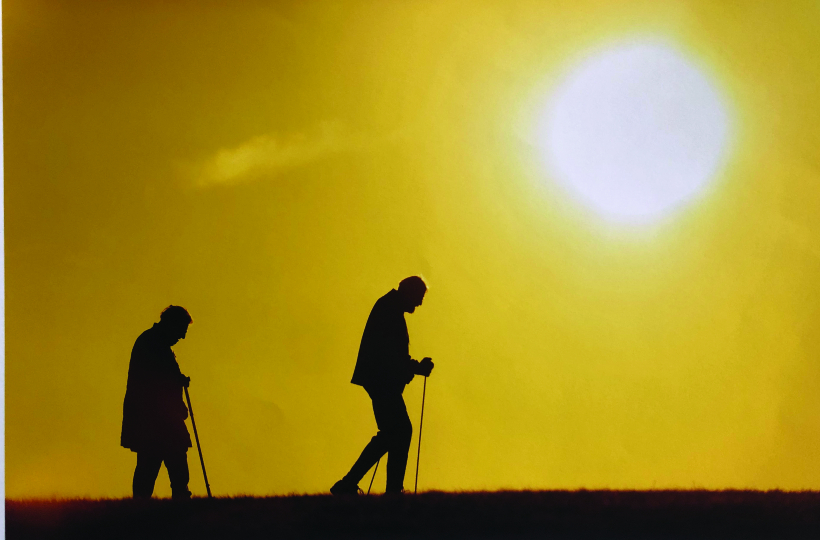
“Majestic Hill”: William and Ruth Moynihan walking together on Horsebarn Hill in Storrs, Connecticut, in 2016. William was 89 and Ruth was 82. “When my children were little I used to bring them here to look up at the stars,” Ruth said. Bill said he and his wife had been taking walks around the hill for 40 years. “Winter and summer, rain and shine. It really is a majestic hill.” Ruth passed away on October 1, 2018, at age 85, and Bill on March 28 this year at age 93 (Mark Mirko, Hartford Courant)
By William Doino Jr.
When news came that William T. Moynihan, father of Robert, the founder of this magazine, died on March 28, at age 93, it hit those who had known him hard, especially his family and long-time friends.
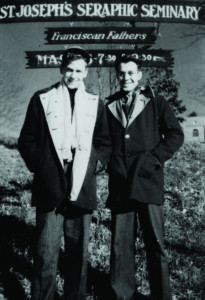
Bill and a friend in 1943 in minor seminary at Callicoon, New York.
I was among the latter, having first met Bill in 1999 — the same year, as it happened, that my own father died, suddenly and prematurely. Although I didn’t realize it at the time, my new friendship with Bill was an unexpected gift — God’s way of sending me an intellectual and spiritual foster father, at the very moment I needed one most. It was a role that came naturally to Bill, having already raised seven children with his wonderful wife, Ruth (who went to the Lord two years before Bill, but would also become a dear friend).
Much of this had to do with Bill’s bedrock Catholic values, which he learned as a child, and grew stronger as he matured. Born in Massachusetts in 1926, to Richard and Harriet Moynihan, the youngest of four siblings, Bill attended St. James School in Haverhill until World War II broke out. After the US was attacked at Pearl Harbor, Bill eagerly tried to enlist, just as his brothers had. But he was too young to fight, so he opted, instead, to explore the religious life, entering St. Joseph’s seminary in New York, with the idea of becoming a Franciscan friar.
As grateful as he was for this spiritual training — which fortified his soul, preparing him for the vicissitudes of life — Bill still longed to be a soldier. So, after deep consideration, and before taking any vows, he changed course again, joining the U.S. Marine Corps in 1946. After completing his Basic Training on Paris Island — with flying colors — he was assigned to the Marine Headquarters in Washington, DC. There, he quickly rose to an influential position, and learned a great deal about strategy, diplomacy, peace and war.
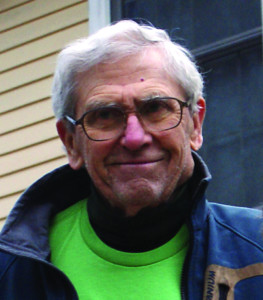 Bill’s time in the Marines strengthened him in three invaluable ways: it taught him the importance of personal discipline; it gave him a deep appreciation for the rich diversity of American culture, symbolized by the many soldiers he met, from every different background; and it made him far more, not less, sensitive to the perils of war. That insight tempered Bill’s early and somewhat romantic ideas about military life, but aligned well with his Catholic faith and increasing concern for world peace.
Bill’s time in the Marines strengthened him in three invaluable ways: it taught him the importance of personal discipline; it gave him a deep appreciation for the rich diversity of American culture, symbolized by the many soldiers he met, from every different background; and it made him far more, not less, sensitive to the perils of war. That insight tempered Bill’s early and somewhat romantic ideas about military life, but aligned well with his Catholic faith and increasing concern for world peace.
“Anyone who thinks most soldiers and their families are itching to get into a major conflict have got it completely wrong,” he once told me, reflecting on his time in the Marines.
“The vast majority of soldiers are among those least likely to want war, precisely because they’ve studied or directly experienced it, and know its enormous cost.” Moreover, he stressed, during a geopolitical crisis, pursuing a just peace — if one can be obtained, through concerted diplomacy — “should always be the first option before any kind of military action is considered — and even then, only as a last resort, in strict accordance with the Church’s just war criteria.”
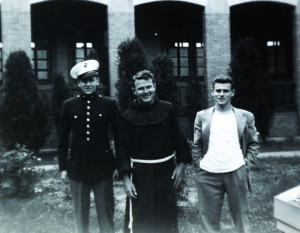
Bill in his Marine Corps uniform, Father Kennedy, and, right, Bill’s older brother Bob, who entered the Franciscan Order
I’ve never forgotten those sobering words, and still think about them today whenever I hear voices clamoring for military action as a “solution” to a global conflict — even if it’s likely to produce worse evils, and long before it has become a last resort.
Though he was too humble to admit it, Bill was also a champion of the Faith, rounding up a large number of marines in his barracks to attend Sunday Mass. “He was a leader of men,” said fellow Marine James O’Connor who, along with the late George C. Scott (who would later win an Oscar for his title role in Patton), was in the Marine Corps with Bill in those years. “The greatest man I have ever known. He and George used to have debates about the Faith, and Bill always won. He was so well-educated in the Faith, no one could best him in debate.”
After his honorable discharge, and with the assistance of the GI bill, he attended St. Bonaventure University, obtaining a degree in English literature. A talented writer, Bill soon became a freelance journalist, and it was then that his life took an unexpected turn — literally and figuratively. As the Hartford Courant put it, in its obituary of Bill:
“He was assigned to report from Meriden, CT, and on a fateful New Year’s Eve of 1952, he experienced a life-changing combination of bad luck and extraordinary good fortune. He skidded and crashed his car in an ice storm on the Merritt Parkway, then encountered his future wife, the brilliant Ruth MacKenzie Barnes of Wallingford, CT. They were both intensely literate, principled and passionate, so only a few months later they wed, beginning an extraordinary 65-year marriage that lasted until Ruth’s death in 2018.”
Desiring a large family, but knowing he would have to find a more stable job to provide for them, Bill obtained his PhD in literature from Brown University, and was hired as an English professor at the University of Connecticut, where he flourished. Ruth anchored the Moynihan’s growing family at home, but she too would later obtain a PhD, in American history, and become a highly regarded teacher and writer herself.
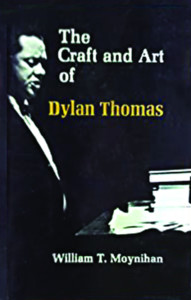 After just six years of teaching at UConn, Bill was so esteemed by his colleagues that he was elected chairman of the university’s English department, which he led for an unprecedented twenty years. During that time, he wrote textbooks on writing, was awarded a Fulbright Fellowship to teach abroad, wrote an acclaimed study on the Welsh poet Dylan Thomas, and led many academic exchanges —“all while leading the department with charm, wit and the steady hand of an ex-marine,” as the Courant aptly noted.
After just six years of teaching at UConn, Bill was so esteemed by his colleagues that he was elected chairman of the university’s English department, which he led for an unprecedented twenty years. During that time, he wrote textbooks on writing, was awarded a Fulbright Fellowship to teach abroad, wrote an acclaimed study on the Welsh poet Dylan Thomas, and led many academic exchanges —“all while leading the department with charm, wit and the steady hand of an ex-marine,” as the Courant aptly noted.
After stepping down as department chair, Bill began a second career as a playwright, writing celebrated plays involving faith, culture, and politics, which garnered national praise and attention. Everything he touched turned to gold.
That remained true after he retired, when Bill provided expert advice, and elegant writing, for Inside the Vatican, his son Bob’s magazine, founded in 1993. Bill’s indispensable assistance extended to ITV’s crop of new writers, including myself.
I can vividly recall my first assignment for Inside the Vatican — a forceful response to John Cornwell’s sensational anti-Pius XII tract, Hitler’s Pope. After I submitted my article to Bob, he brought his father in to assess it. Bill told me it was “excellent, but”— there was always a “but”— it wasn’t sufficient. “Your article powerfully answers Cornwell’s central thesis, but we need more,” he told me. “We need to chronicle the history of modern anti-Catholicism, and explain how and why such a scurrilous book could have been published in the first place. Then we have to incorporate the findings of the world’s leading historians on Pius XII, comparing their scholarship with Cornwell’s tract, and pinpoint Cornwell’s most inexcusable errors. Finally, we have to find, interview and quote those who worked with Pius XII to combat Nazi barbarism and rescue persecuted Jews from the death camps — and contrast their first-hand testimonies with Cornwell’s baseless and uninformed charges….”
In Bill’s view, ITV needed to turn our response into “a major cover story and special edition — with at least a dozen high quality articles and interviews, which will demolish this poor excuse for a book.”
We did exactly that, and our special issue was hailed throughout the world as among the best rebuttals to Cornwell’s (now-discredited) polemic.
That was just one of many articles and special issues, covering a wide array of topics, which Bill helped ITV’s team craft, edit and sharpen.
Over and above his editorial genius, which I profited so much from as a young writer, Bill became a mentor to me — not just on Church-related issues, but on almost any topic. His knowledge was vast, and he had an uncanny ability to answer any question I asked in the most patient, learned and convincing manner. He was my unequalled tutor — and did it all so graciously, never asking anything in return. I once asked him what his secret was in becoming such a special mentor to so many students and writers, and he replied, “Prayer and God’s grace.” Humility was a hallmark of Bill’s sterling character.
So was perseverance in the face of adversity.
Early on in our friendship, Bill took a sudden fall during an ice-storm, and hit his head badly, plunging him into unconsciousness. It was a terrifying experience for his family and friends, and for a while, we thought we might lose him. But God, in his infinite mercy, answering all our prayers, brought Bill back from the brink and — miraculously to me — he returned to full health rapidly. When we first spoke after his ordeal, he hadn’t missed a beat, and cracked, “Doino, I hope you weren’t taking it easy while I was away!”
That was classic Bill Moynihan: for him, time was of the essence. It was a precious gift, never to be squandered on frivolous things. Long before “quality time” became part of our lexicon, Bill lived it, apart from his work — devoting his quality time to the Mass and sacraments, his family and friends, and helping others, especially by practicing the spiritual and corporal works of mercy with Ruth.
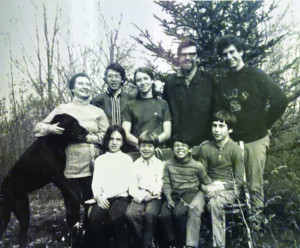
Above, the Moynihans in 1971. Top row from left: Ruth, Ted, Elaine, Bill, Bob; bottom row, Susan, Richard, Ben and Neil.
Bill was a prolific and tireless worker, but never a “workaholic.” He took periodic breaks from his teaching and writing, and expressed joy in the natural, God-given pleasures of life — walking, tending his garden, watching a terrific baseball game, and listening to classical music. He avoided modern vices, but always welcomed what he called “appropriate fun.”
For over twenty years, I spoke to Bill at least once a week, sometimes more, and what I learned from him over that time has stayed with me. I believe he made me a better writer, and — I hope — a better human being and Catholic. I can never repay the debt I owe Bill, but am consoled by having been able to say a last, moving goodbye.
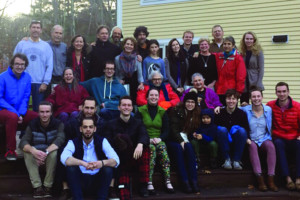
a Thanksgiving photo from four years ago of Ruth and Bill (in the center) with children, children’s spouses, and grandchildren.
During the final year of his life, I knew Bill had been ill, so I limited my calls to his home. But just a week before he died, something prompted me to call, and when I did, was gently told that he was extremely ill, and almost certainly wouldn’t recognize my voice. But I asked his caregiver if she could put the telephone up to his ear, so I could try and briefly communicate with him, however distant the possibility. After a brief internal prayer, I tried to make my last words to him simple but heartfelt. I said, “Dr. Moynihan — this is Bill Doino. I know you are very sick right now, but I have asked God to allow you to recognize my voice and understand what I say…and I just wanted to tell you how much our friendship has meant to me, how much I have learned from you, what a privilege it’s been to know you, and to tell you I have no doubt God is going to reward you and welcome you with open arms because of all the great and unforgettable things you’ve done for your family and for so many people, like me.”
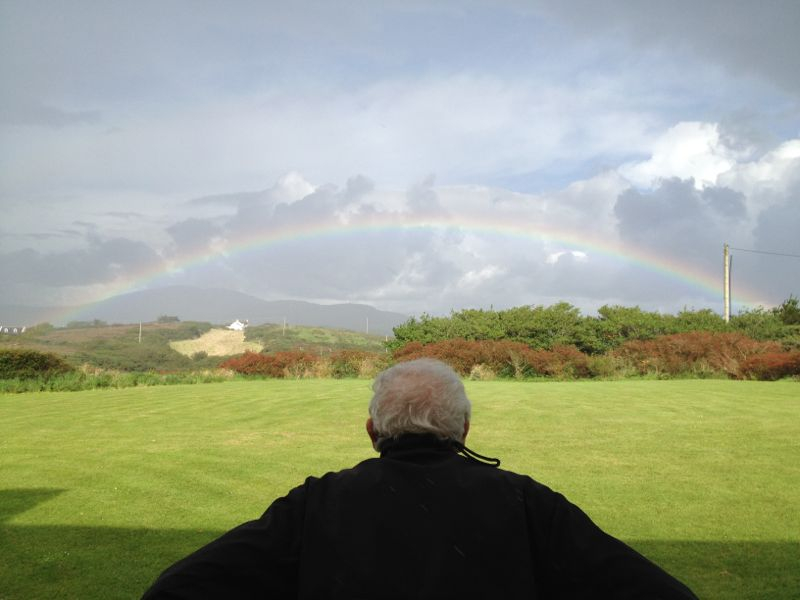
Bill in Schull, Ireland, in the summer of 2012, though he had already found the pot of gold at the end of the rainbow, in his family and friends like Bill Doino.
There was a moment of silence, as I anxiously waited for a reply, and then I heard Bill say, in a struggling but discernible voice, “Thank you, Bill,”— he recognized it was me! — “I can’t talk because I am not well. But you have been a great friend, too.” And that was it.
His caregiver then came back on the phone and said, emotionally, “Thank you. That was very beautiful.”
“Oh, but thank you!” I said, with immense gratitude.
Just a week later I was told by a close mutual friend that Bill had died peacefully, after receiving the last rites from his local pastor. He leaves behind his seven children, their spouses and nineteen grandchildren — an incredible legacy that leaves me in awe.
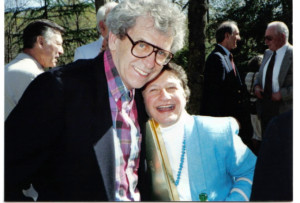
Bill and Ruth in 2016
The Courant reported that in their retirement, Bill and Ruth made their home “a cheerful gathering spot for three generations of Moynihans and their numerous dogs. Each year he and Ruth hosted a Thanksgiving feast, where after the blessing Bill would always sing his solemn sustained ‘Amen’ as all joined in. Bill often said, ‘I have the greatest family. It couldn’t have worked out more perfectly if I had tried to plan it. I am so thankful.’”
Bill lived a spiritually rich and extraordinary life, spanning almost a century, but he was such a towering figure that his family and friends will miss him dearly. His passing remains a fresh wound in my heart, for after the piercing loss of my own father, Bill had become his moral and spiritual successor, and an irreplaceable part of my life.
A short time after my final conversation with Bill, my mind kept wandering back to a long conversation we had about Dylan Thomas, the brilliant but mercurial poet who tragically died young because of a troubled personal life. Thomas was not a Catholic, but he was a seeker after the truth, and his poems are imbued with Christian overtones, as Bill noted in his book on the great poet. Never was that truer than in Thomas’s poem, “And Death Shall have no Dominion,” which Bill thought among his very best. The poem draws upon Romans 6:9 — “We know that Christ, raised from the dead, dies no more, death no longer has power over him,” and Revelations , chapter 17, which promises that Christians on rising shall receive new bodies as well.
My prayer is that God has not only reunited Bill with his beloved Ruth in Heaven — of that I have full trust — but, just possibly, I hope — introduced Bill to his favorite poet, now at last having found the truth in Jesus Christ, with all of them sharing in His eternal glory.






Facebook Comments